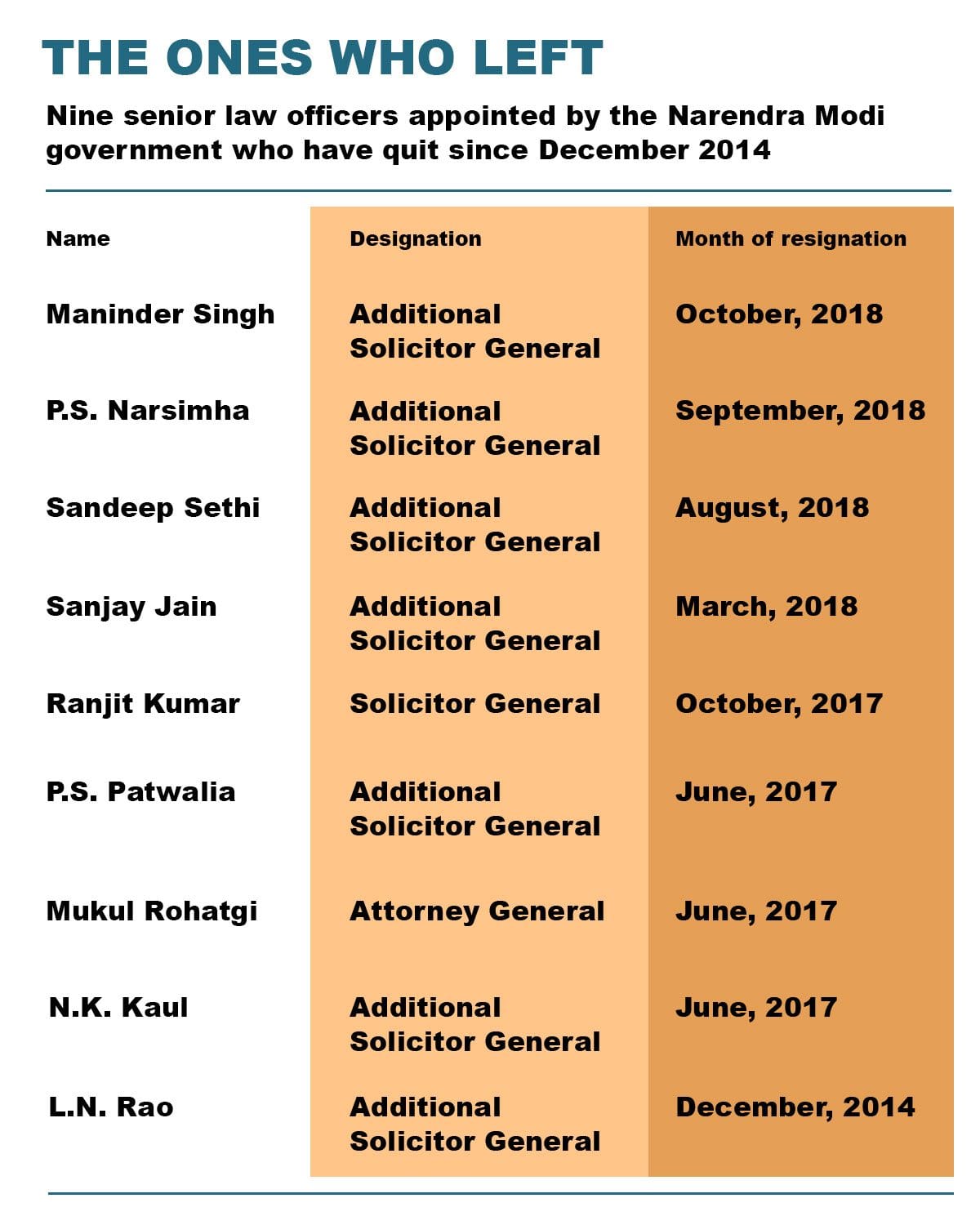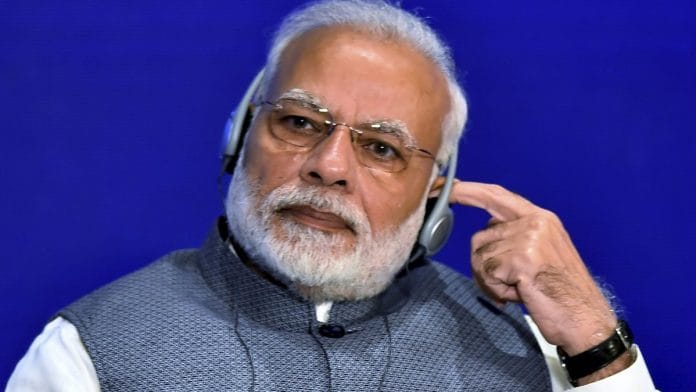The Modi government is yet to complete five years in office, but nine law officers appointed during its term have resigned.
New Delhi: Earlier this month, senior advocate Maninder Singh resigned from his position as the Additional Solicitor General (ASG) after serving as a law officer for over four years — making him the ninth officer to resign under the Narendra Modi government.
Singh, who was the most senior among the five ASGs in the government, resigned on the same day when Tushar Mehta was appointed as the Solicitor General of India, leading to speculation that he was upset over not being chosen for the position.
The Solicitor General’s post was vacant since October 2017 when previous SG Ranjit Kumar resigned.
Singh offered no reason for resigning from the post. The resignation is yet to be accepted by the government.
Singh’s resignation came close on the heels of P.S. Narsimha and Sandeep Sethi’s resignations as ASGs in September and August, respectively.
Also read: Govt’s lawyer in Rohingya, Article 35A and Loya cases is India’s new Solicitor General
Spate of resignations
The Modi government’s term has been fraught with resignations of law officers. While the government is yet to complete five years in office, nine law officers appointed during its term have resigned, leading to concerns over the government’s relationship with law officers.
Since 2016, two top law officers — Mukul Rohatgi (Attorney General) and Ranjit Kumar (Solicitor General) — have resigned from their positions.
Rohatgi, who was considered close to Finance Minister Arun Jaitley, and Kumar, who is an expert in Constitutional law, service matters and taxation, were two of the most prominent law officers appointed by the government.
Further, Neeraj Kishan Kaul, P.S. Patwalia, L.N. Rao and Sanjay Jain also resigned from their positions in the last three years.
This list does not include names of those who resigned in the immediate aftermath of the BJP coming to power in 2014, since it is common practice for law officers appointed by one government to be replaced after the end of its term.

“In earlier times, competence, merit — all these were taken into account. Now, it is just about whether or not law officers are willing to be yes-men or yes-women,” said a senior advocate in the Supreme Court, who did not wish to be named.
The frequent departures are a symptom of the power-play within the BJP high-command, the lawyer added. “When Arun Jaitley was powerful, he got his own people — Mukul (Rohatgi), Ranjit Kumar, Maninder Singh — they were all his men.”
“Now, it is Amit Shah calling the shots. So, you can see, Tushar Mehta is close to Amit Shah, and he’s now the solicitor general,” he said.
UPA’s record
To be sure, the United Progressive Alliance (UPA)’s second term was also marred by some controversial resignations. Between 2009 and 2014, at least seven law officers resigned from their positions.
The first to quit was former Solicitor General Gopal Subramanium in July 2011. Subramanium reportedly felt slighted when the UPA government hired a private lawyer to represent the telecom ministry — a ministry represented by him — in the 2G scam case.
Also read: More than 5,000 lower-judiciary level posts vacant: Law minister Ravi Shankar Prasad
Subramanium’s resignation was followed by his successor Rohinton Nariman in February 2013, barely eighteen months into his tenure. Reports say his decision came over differences with the law ministry and then law minister Ashwani Kumar. Nariman is now a Supreme Court judge.
At least five ASGs — Parag Tripathi, Vivek Tankha, Mohan Parasaran, Biswajit Bhattacharya and Harin Raval — also quit during this time.
However, Tankha said nobody resigned because of politics during the UPA tenure.
“I, for example, resigned due to personal reasons. There were some clashes here and there, but those were rare,” added Tankha.
Impact on government legislation
“In this government, what you see is a complete collapse. All their main faces from Rohatgi to Ranjit Kumar have left them,” said Tankha.
The frequent departures have an obvious impact on the quality of government legislation.
Nearly 15,000 cases are pending in the Supreme Court where the Centre is a party, according to official data.
“Of course, there is a disadvantage to these frequent resignations,” said Tankha. “There is a disconnect the moment someone who was handling an important case leaves.”
“And second, it is not easy to get replacements,” he further added. “Some very good people have left them, and it is not easy to find substitutes for them.”
After Singh’s resignation, there are no more than four ASGs for the Centre in the top court. These include Atmaram Nadkarni, Pinky Anand, Aman Lekhi and Vikramjit Banerjee. During UPA II, the number of ASGs was 11.
Four ASGs for the Central government used to be the number during the 1950s, Tankha added.
‘Usual practice’
However, it is very common for lawyers to be appointed as law officers and then return to private practice, said a former ASG, who did not wish to be named.
“Being a law officer is like a rubber stamp. People want to have it and then leave,” the officer said.
“There is nothing peculiar about this government or that.”
Being a law officer for the government is a “high pressure job,” he added. “Not everyone wants to do it for too long, and that is perfectly okay.”







Prof PK Sharma,Freelance Journalist,Barnala (Punjab)
What a pell-mell in various walks of life in India ! The law officers are not happy !
Earlier in the beginning of 2018, the Honorable Apex Court four judges- Justice Jasti Chelameswar, Justice Ranjan Gogoi,Justice Madan B.Lokur and Justice Kurian Joseph expressed their resentment against the system holding a press conference to air their
views !
CBI too in doldrums is now mired in intercine controversies and tug of wars !
Ironically,nation seems to have fallen on evil and wicked times !
Now only the Almighty to come to the rescue of the nation !
Are things not apparently beyond the control and powers of human beings now ?
Prof PK Sharma, Freelance Journalist
Pom Anm Nest, Barnala (Punjab)
Ghoolam Vahanvati had it all. Five years as Advocate General of Maharashtra, from 1999, then Solicitor General for five years under UPA I, five as Attorney General under UPA II.